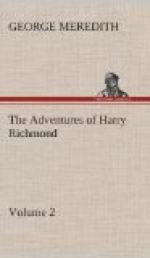I was obliged to request Temple not to joke, but the next moment I had launched Captain Jasper Welsh on a piratical exploit; Temple lifted the veil from his history, revealing him amid the excesses of a cannibal feast. I dragged him before a British jury; Temple hanged him in view of an excited multitude. As he boasted that there was the end of Captain Welsh, I broke the rope. But Temple spoiled my triumph by depriving him of the use of his lower limbs after the fall, for he was a heavy man. I could not contradict it, and therefore pitched all his ship’s crew upon the gallows in a rescue. Temple allowed him to be carried off by his faithful ruffians, only stipulating that the captain was never after able to release his neck from the hangman’s slip knot. The consequence was that he wore a shirt-collar up to his eyebrows for concealment by day, and a pillow-case over his head at night, and his wife said she was a deceived unhappy woman, and died of curiosity.
The talking of even such nonsense as this was a relief to us in our impatience and helplessness, with the lights of land heaving far distant to our fretful sight through the cabin windows.
When we had to talk reasonably we were not so successful. Captain Welsh was one of those men who show you, whether you care to see them or not, all the processes by which they arrive at an idea of you, upon which they forthwith shape their course. Thus, when he came to us in the cabin, he took the oil-lamp in his hand and examined our faces by its light; he had no reply to our remonstrances and petitions: all he said was, ’Humph! well, I suppose you’re both gentlemen born’; and he insisted on prosecuting his scrutiny without any reference to the tenour of our observations.
We entreated him half imperiously to bring his ship to and put us on shore in a boat. He bunched up his mouth, remarking, ’Know their grammar: habit o’ speaking to grooms, eh? humph.’ We offered to pay largely. ‘Loose o’ their cash,’ was his comment, and so on; and he was the more exasperating to us because he did not look an evil-minded man; only he appeared to be cursed with an evil opinion of us. I tried to remove it; I spoke forbearingly. Temple, imitating me, was sugar-sweet. We exonerated the captain from blame, excused him for his error, named the case a mistake on both sides. That long sleep of ours, we said, was really something laughable; we laughed at the recollection of it, a lamentable piece of merriment.
Our artfulness and patience becoming exhausted, for the captain had vouchsafed us no direct answer, I said at last, ’Captain Welsh, here we are on board your ship will you tell us what you mean to do with us?’
He now said bluntly, ’ I will.’
‘You’ll behave like a man of honour,’ said I, and to that he cried vehemently, ‘I will.’
‘Well, then,’ said I, ’call out the boat, if you please; we’re anxious to be home.’




